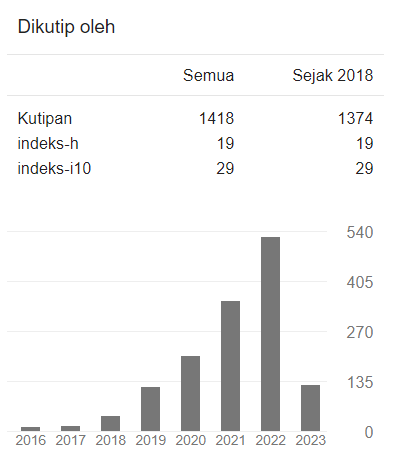Penerimaan Teknologi E-Learning SiPeDar Dengan Menggunakan Technology of Acceptance Model (TAM)
DOI:
https://doi.org/10.22219/jp2sd.v10i2.22314Abstract
SiPeDar is an e-learning platform developed by UST to facilitate learning from the campus academic community. The application of Information Technology is always related to user acceptance. Therefore, the purpose of this study is to obtain empirical evidence related to the acceptance of SiPeDar technology using the Theory of Acceptance Model (TAM) framework with the construct of perceived ease of use, perceived usefulness, attitude toward using, and acceptance of e-learning system (acceptance of e-learning system). The sample of this study was 77 students from UST Yogyakarta PGSD students who were randomly selected. The data collection technique employed a questionnaire distributed through Gform. The data analysis technique used is quantitative descriptive data analysis using the SPSS program. The results showed that the perceived ease of use of SipeDar and students' perceived usefulness towards SiPeDar were good. The students' attitude towards using SiPedar shows a reasonably good assessment category. SiPeDar's actual system usage shows a high level of usage among students.
Downloads
References
Abidah, A., Hidaayatullaah, H. N., Simamora, R. M., Fehabutar, D., & Mutakinati, L. (2020). The Impact of Covid-19 to Indonesian Education and Its Relation to the Philosophy of “Merdeka Belajar.” Studies in Philosophy of Science and Education, 1(1), 38–49. https://doi.org/10.46627/SIPOSE.V1I1.9
Alvianto, A. (2020). Efektivitas Pembelajaran Daring Pada Mata Kuliah Pendidikan Agama Islam Dalam Situasi Pandemi Covid-19. TA’DIBUNA: Jurnal Pendidikan Agama Islam, 3(2), 13. https://doi.org/10.30659/jpai.3.2.13-26
Arifin, B., Roisatul, F., Muzakki, A., & ikhlasatul riska, L. (2022). Implementasi Pembelajaran PJOK Pada Masa Pandemi Covid-19 di Sekolah Dasar. Jurnal Pemikiran Dan Pengembangan Sekolah Dasar, 10 No.1(2338–1140, 2527–3043), 104–111.
Bolliger, D. U., & Martin, F. (2018). Instructor and student perceptions of online student engagement strategies. Https://Doi.Org/10.1080/01587919.2018.1520041, 39(4), 568–583. https://doi.org/10.1080/01587919.2018.1520041
Hakim, M., & Mulyapradana, A. (2020). Pengaruh Penggunaan Media Daring dan Motivasi Belajar Terhadap Kepuasan Mahasiswa Pada Saat Pandemik Covid-19. Widya Cipta: Jurnal Sekretari Dan Manajemen, 4(2), 154–160. Retrieved from https://ejournal.bsi.ac.id/ejurnal/index.php/widyacipta/article/view/8853
Hamidy, R., Hamidy, R. R., Mashur, M., & Yaqin, L. N. (2021). Faktor yang Mempengaruhi Pembelajaran Daring Melalui LMS pada Masa Covid 19. Edumatic: Jurnal Pendidikan Informatika, 5(2), 288–295. https://doi.org/10.29408/edumatic.v5i2.4158
Herliandry, L. D., Nurhasanah, N., Suban, M. E., & Kuswanto, H. (2020). Pembelajaran Pada Masa Pandemi Covid-19. JTP - Jurnal Teknologi Pendidikan, 22(1), 65–70. https://doi.org/10.21009/JTP.V22I1.15286
Islami, M. M., Asdar, M., & Baumassepe, A. N. (2021). Analysis of Perceived Usefulness and Perceived Ease of Use to the Actual System Usage through Attitude Using Online Guidance Application. Hasanuddin Journal of Business Strategy, 3(1), 52–64. https://doi.org/10.26487/HJBS.V3I1.410
Komalasari, R. (2020). Manfaat Teknologi Informasi dan Komunikasi di Masa Pandemi Covid 19. Tematik : Jurnal Teknologi Informasi Komunikasi (e-Journal), 7(1), 38–50. https://doi.org/10.38204/TEMATIK.V7I1.369
Manguma, V. V. E. (2021). Strategi Generasi Millenial Bertahan Hidup Dalam Masa Pandemi Covid-19. Emik, 4(1), 84–97. https://doi.org/10.46918/EMIK.V4I1.934
Nahariah, N. (2022). Pemanfaatan Teknologi Pembelajaran Di Masa Pandemi Covid-19. Jurnal Al-Qiyam, 3(1), 68–72. https://doi.org/10.33648/alqiyam.v3i1.200
Najib, K. H., Alvianto, A., Hidayatullah, A. S., & Ardhian, T. (2022). Pembelajaran Selama Pandemi Covid-19: Kesiapan Belajar Daring dan Stress Akademik Pada Mahasiswa. Jurnal Imiah Pendidikan Dan Pembelajaran, 6(2). https://doi.org/10.23887/JIPP.V6I2.42959
Natawibawa, I. W. Y. G. I. R. (2018). Jurnal Ilmiah Administrasi Publik ( JIAP ) Theory of Reasoned Action sebagai Prediktor Whistleblowing Intention Pengelola. Jurnal Ilmiah Administrasi Publik, 4(4), 310–319.
Nurafni, & Ninawati, M. (2021). Efektivitas Penerapan Aplikasi Linktree dan Wordwall Terhadap Motivasi Intrinsik Siswa Kelas V Sekolah Dasar. Jurnal Pemikiran Dan Pengembangan Sekolah Dasar (JP2SD), 9(2), 217–225. Retrieved from https://ejournal.umm.ac.id/index.php/jp2sd/article/view/17317
Rachmadtullah, R., Yustitia, V., Setiawan, B., Fanny, A. M., Pramulia, P., Susiloningsih, W., … Ardhian, T. (2020). The challenge of elementary school teachers to encounter superior generation in the 4.0 industrial revolution: Study literature. International Journal of Scientific and Technology Research, 9(4), 1879–1882.
Ridha, M. (2021). Interaksi dan implikasinya terhadap optimalisasi capaian kompetensi pembelajaran daring. Kwangsan: Jurnal Teknologi Pendidikan, 9(2), 153–166. https://doi.org/10.31800/jtp.kw.v9n2.p153--166
Sebastianelli, R., Swift, C., & Tamimi, N. (2015). Factors Affecting Perceived Learning, Satisfaction, and Quality in the Online MBA: A Structural Equation Modeling Approach. Https://Doi.Org/10.1080/08832323.2015.1038979, 90(6), 296–305. https://doi.org/10.1080/08832323.2015.1038979
Septyarini, E., & Rosiana, A. (2021). Sumber daya manusia dan e-learning system ( sipedar ) sebagai media knowledge sharing pada keberhasilan studi dengan pendekatan vie ( valance , instrumentality and expectancy ) Human resources and e-learning system ( sipedar ) as knowledge sharing media o. 17(3), 565–570.
Shen, C. wen, Ho, J. tsung, Ly, P. T. M., & Kuo, T. chang. (2019). Behavioural intentions of using virtual reality in learning: perspectives of acceptance of information technology and learning style. Virtual Reality, 23(3), 313–324. https://doi.org/10.1007/s10055-018-0348-1
Trisniawati, T., Muanifah, M. T., Rhosyida, N., & Hidayat, R. A. (2021). Eksplorasi Hasil Belajar Matematika melalui Penerapan Sistem Pembelajaran Daring (SIPEDAR) di Masa Pandemi Covid-19. AlphaMath : Journal of Mathematics Education, 7(1), 57. https://doi.org/10.30595/alphamath.v7i1.10195
Wahid, S. M. Al, Kusnadi, D., & Fantiro, F. A. (2020). Persepsi Mahasiswa dalam Penggunaan Ragam Platform Pembelajaran Daring. Jurnal Pemikiran Dan Pengembangan Sekolah Dasar (JP2SD), 8(2), 170–178. https://doi.org/10.22219/jp2sd.v8i2.15030
Zaineldeen, S., Hongbo, L., Koffi, A. L., & Hassan, B. M. A. (2020). Technology acceptance model’ concepts, contribution, limitation, and adoption in education. Universal Journal of Educational Research, 8(11), 5061–5071. https://doi.org/10.13189/ujer.2020.081106
Downloads
Published
Issue
Section
License
Copyright (c) 2022 Jurnal Pemikiran dan Pengembangan Sekolah Dasar (JP2SD)

This work is licensed under a Creative Commons Attribution-ShareAlike 4.0 International License.
Authors who publish with Jurnal Pemikiran dan Pengembangan Sekolah Dasar (JP2SD) agree to the following terms:
- For all articles published in Jurnal Pemikiran dan Pengembangan Sekolah Dasar (JP2SD), copyright is retained by the authors. Authors give permission to the publisher to announce the work with conditions. When the manuscript is accepted for publication, the authors agree to automatic transfer of the publishing right to the publisher.
- Authors retain copyright and grant the journal right of first publication with the work simultaneously licensed under a Creative Commons Attribution-ShareAlike 4.0 International License that allows others to share the work with an acknowledgment of the work's authorship and initial publication in this journal.
- Authors are able to enter into separate, additional contractual arrangements for the non-exclusive distribution of the journal's published version of the work (e.g., post it to an institutional repository or publish it in a book), with an acknowledgment of its initial publication in this journal.
- Authors are permitted and encouraged to post their work online (e.g., in institutional repositories or on their website) prior to and during the submission process, as it can lead to productive exchanges, as well as earlier and greater citation of published work (See The Effect of Open Access).

This work is licensed under a Creative Commons Attribution-ShareAlike 4.0 International License.


















